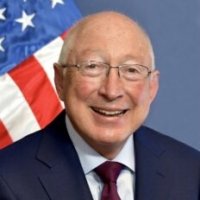Toward a Safe, Secure, and Clean Energy Future
"This is the moment to dream a new energy future," declared Ken Salazar, U.S. Secretary of the Interior, at a presentation at the Woodrow Wilson International Center for Scholars on September 30. Secretary Salazar spoke about the future of U.S. energy needs and resources, clean energy sources, and the impacts of the recent Deepwater Horizon oil spill on drilling development policy, in an address followed by questions from the audience.
Secretary Salazar began his speech by addressing the role of clean energy technologies in the future of U.S. energy consumption. He pointed to several examples of increased clean energy sources but also cautioned that the U.S. is "falling behind China and India in the race for clean energy technologies and clean energy jobs." In order to ensure that the U.S. remains competitive in the energy sector, he emphasized the need to continue to develop clean energy initiatives.
He also recognized, however, that in order to meet rising energy demands, the U.S. will continue to rely on conventional fossil fuels for some time. To ensure that these resources are used wisely, he stressed the need for reforms in our nation's oil and gas programs, specifically in the area of deepwater drilling. He highlighted six steps in the drilling process and explained how his administration is improving regulation for each one:
- In buying leases for drilling, Secretary Salazar noted that the Arctic, North Atlantic, Pacific and Bristol Bay coasts are now off limits to drilling development, a reversal from the previous Administration's policy. He also cited the establishment of "an open, science-based process" for deciding new oil and gas exploration sites.
- Proposed leases must undergo "thorough environmental reviews based on sound science," the Secretary said. Here he pointed to the Bureau of Ocean Energy Management's (BOEM) new limits on categorical exclusions under the National Environmental Policy Act
- Drill operators must "meet new standards for well-design, casing, and cementing," the Secretary said, highlighting his administrations efforts to strengthen regulation and close loopholes exempting operators from worst-case discharge requirements.
- For their period of drilling activity, he emphasized the need for tougher workplace and environmental safety standards for drills, specifically in blowout preventers. He also noted that energy company CEOs are now held personally accountable for their drills meeting safety and environmental standards, having to certify themselves that they do meet them.
- Responses to disasters need to be institutionalized so that companies and the U.S. government can take effective action in the case of a disaster. In this regard his administration is developing new recommendations.
- Strong, independent agencies need to be established to police offshore oil and gas development. Secretary Salazar cited the abolition of programs and agencies with conflicting missions related to oil and gas development regulation and stressed the importance of current investigations examining regulatory agencies and companies suspected of malfeasance.
In moving forward on strengthening regulation of oil and gas development, Secretary Salazar announced two new rules for the industry. The first is called the Drilling Safety Rule, which creates "tough new standards for well-design, casing, and cementing," the Secretary said. The rule is designed to prevent blowouts by strengthening well bore integrity and well control equipment.
The second rule is called the Workplace Safety Rule, designed to reduce the possibility of human and organizational errors that may cause accidents and spills. It provides comprehensive safety and environmental rules for identifying "potential hazards when they drill, protocol for addressing those hazards, and strong procedures and risk-reduction strategies for all phases of activity," the Secretary said. For the future, he said that BOEM Director Michael Bromwich will proceed to create further rules to improve design standards for blowout preventers.
Secretary Salazar recognized concerns of increased costs on industry imposed by these new regulations but stressed their importance and the standardization of the process to help reduce additional costs. Crises spur action, the Secretary said, referring to the Deepwater Horizon oil spill, and now is the time to move forward with the U.S.'s energy policy.
Drafted by Drew Sample.
Speaker

Hosted By

Environmental Change and Security Program
The Environmental Change and Security Program (ECSP) explores the connections between environmental change, health, and population dynamics and their links to conflict, human insecurity, and foreign policy. Read more
